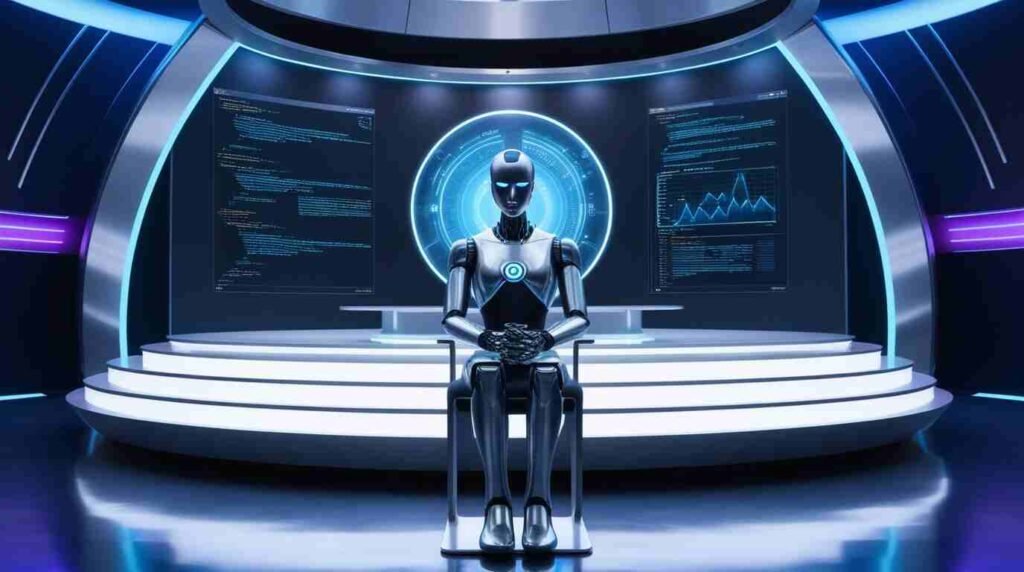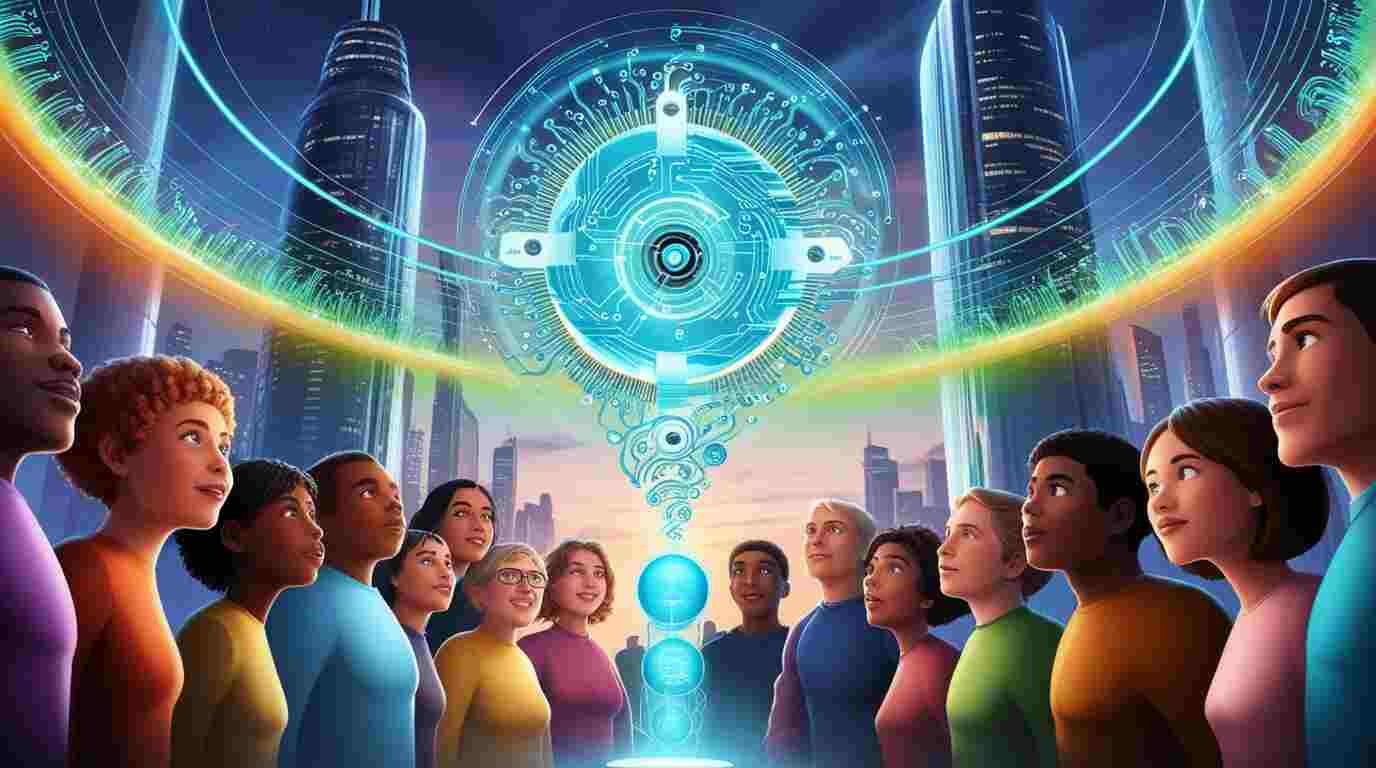Hello people!Is it possible for Artificial Intelligence to take charge of the world better than human beings?This idea that ‘AI’ is running the world has been timelessly implied, constructed, and debated in poetry, literature, movies, television shows, and philosophy. Some people think that Artificial Intelligence will overtake the human brain in the near future, and others are concerned about the danger of automation. We must now ask whether ‘it’ can manage things better than human beings. It encompasses any service and product delivery system’s technology, ethics, economics, and governance components. In this article, the author focuses on what might make it possible for AI to triumph over humans in managing the world, the corresponding dangers, and the ethos issues consequent to the increasing reliance on artificial intelligence in decision-making processes.
Let’s dive in!
The Emergence of Smart Technology

AI has been experiencing steady growth in the last few decades, specifically with machine learning, neural networks, and natural language processing. These technologies have allowed AI to perform many tasks and solve issues that formally could only be done by human beings, for instance, complicated board games like Go, drawing relationships between exceedingly large sets of data and producing original creative products like music or paintings.
AI can improve and benefit nearly every industry and aspect of human living, from medicine to finance and schools to power generation. It can analyze information much faster than any human being and, therefore, come up with decisions to manage the analysis of such information. For instance, in the financial industry, using chatbots, AI algorithms are used to buy and sell stocks and analyze market trends with the ultimate speed that even advanced Hugh performers cannot dream of. AI is being applied in medicine, where the data collected is analyzed to help in the diagnosis of diseases in which the AI approach is more viable than the conventional human approach.
This paper seeks to evaluate the efficiency of Artificial Intelligence in decision-making
Indeed, one of the main driving reasons behind AI being presented with a larger responsibility for managing the world is that it does so objectively, relying on data rather than passion or prejudice. In its integrality, humans rely mostly on intelligence to make choices, influencing them with feelings, biases, and opinions. AI will make decisions based on facts, and it will do so without requiring any break, without partiality, and without those barriers that hinder the normal functioning of humans.
As with other applications of AI, real-time analysis of large data sets can be performed, and these details can be used in the best way. This efficiency is especially significant in fields like supply chain management, resource planning, and decision making, or in public administration where there invariably will be numerous factors that need to be considered. For instance, AI could put natural resources to the best use by applying the data collected in real-time on energy usage, the environment, and the market for a policy that would cater to human wants while protecting the environment.
Further, because AI can analyze data forward through data modeling, it can also prevent catastrophes from occurring in the first place. For such applications, AI might simulate what might happen in climate science or a disaster response context, suggesting what to do to reduce risky outcomes before politicians and other policymakers may even fully agree on a shared definition of the problem.
AI in Governance The Possibility of Bureaucracy Beyond the Human
People always have complaints to make against their governments, and the main complaints are that they need to be more efficient, corrupt, and slow to change strategies whenever new issues crop up. In theory, AI could solve many of these problems by forming a bureaucracy that works competently and equitably. It becomes apparent that a Weberian bureaucracy led by machines could study laws, policies, and regulations in real time, fine-tuning them to reflect the needs of society at a given time.
It can also be applied to world politics because AI could assess different countries’ stances and offer the best solutions to reduce the occurrence of wars. For the same reasons, I argued that AI would not have personal or national biases since the model is employed globally to arbitrate negotiations.
Additionally, it has the potential to observe elections and any political process, usually to check for rigging. Unscrupulous and dishonest people are rife in many parts of the world, eroding democracy. An AI system that deals with elections could capture electoral fraud, deter the manipulation of the votes, and make a correct tally. It also empowered AI to calculate the efficiency of determined policies, with consequent feedback on its result and necessary changes.
AI governance systems could, in principle, remove most of the waste and illegitimacy that characterize human political systems. They could help accelerate decision-making and increase openness, which is always good, but when politics is involved, lobbyists or some interest groups often distort such aspects.
The Case of AI in Economic Management
Economics is another sector where artificial intelligence could become more beneficial in management than humans. It is like a billion-dollar route or equation in the global economy in which billions of factors are constantly in action. The present periods often provide an incomplete understanding of the issue to human economists and policymakers, hence implementing policies that worsen the economic situation.
AI, given the opportunity to process large amounts of data in the shortest time possible, could manage economical systems better. It could forecast the market direction, enhance the selling and procurement processes, control inflation, and offer tax policies to achieve economic fairness. Furthermore, an economy managed by Artificial Intelligence would adapt in real-time to the changes in the market environment and thus be more effective than any human-managed economy.
Theoretically, AI could help prevent regular economic crises by immediately identifying bubbles or a tendency towards imbalance. AI could also develop economic policies to calibrate the needs of regions, industries, or particular groups in society to escape vices of hitches on equal growth and prosperity.
About Risk and Challenges of AI Hegemony
So, if AI is to run the world, as the idea is seething, then there are lots of threats and issues that should be looked at. Another major concern is the alienation of people: maybe the main one is the alienation of human beings. Several aspects need to be considered if machines are already deciding on our behalf; where do individual freedom and accountability go? Will people become mere receptacles for an artificial environment where they would have little control over it?
The third issue is the problem of unforeseen consequences. AI systems are as powerful as the data fed into them, and therefore, a biased or segmented data set means a biased or segmented decision-making system. Besides, its general use of algorithms, which can hardly be explained even to the developers, can be regarded as a problem of transparency and accountability. When an AI system makes an undesirable decision, who is at fault? That brings the question: Can we now hold AI accountable for its actions?
There is also the danger of misuse of AI by authoritarian governments and corporations. AI has the potential to control people, quell protesters, or even change their minds through their fear. Such great potential of AI to transform the world for the better may be used by the power holders for the opposite reason—to maintain the status quo and strengthen the power of certain authorities.
In addition, it postulated that artificial intelligence could work to deepen present disparities. This means that should the development and control of AI stay with the few large corporations and governments and their international associates, a large part of the world may be left out in the cold when it comes to reaping the benefits of the development of AI systems.
Ethical Considerations
The consequences of AI in charge of the world are ethical. One of the biggest questions arising from the topic is whether it is right to entrust machines with so much authority over human existence. Suppose for a moment such an outcome is attainable for AI, to do so more efficiently than us. Could this be a justification for stripping people of control?
Another something that I found unethical is that AI systems are incapable of making decisions that respect human values to rank them up. Whereas AI is based on algorithms and formal parameters, human values are moralistic and may always encase moral dilemmas. It is a challenge to put into figures aspects like justice, fairness, and compassion, and there isn’t a certainty that the AI systems will be able to map decisions concordance with such virtues.
Also, the utilization of Artificial Intelligence introduces the future of work problems. With AI gradually acquiring more tasks to handle on behalf of people, millions of people can lose their jobs as AI handles responsibilities within the shortest time possible, thus causing social vices and unemployment. As to the creation of new opportunities and new industries, AI can appear dubious, for while these jobs may exist, people are still determining if these opportunities are going to be open to the users who lost their careers to the bots. One of today’s greatest problems is guaranteeing that the shift towards the AI-centered world is fair for everyon
Is It Possible For AI to Comprehend People's Inner World?

Another obvious challenge of using AI to manage the world is that this approach will probably always remain beyond AI’s ability to understand human feelings, friendships, and cultural differences. People’s actions only sometimes result from a rational assessment of the information. Emotions, concerns, imagination, and ethical thought are important components of decision-making. Such aspects are inevitably cultural and are still becoming for AI, even if machine learning is a genuine breakthrough.
Conclusion
The supposition that artificial intelligence can manage the world more efficiently than humans is unthinkable. AI has already been shown to work better in certain niches and has great potential in controlling the intricately intertwined economy and government systems. However, the use of AI opens new ways and possibilities for full domination, which come with an equal string of concerns, risks, and questioning of ethics. One problem is that humans need to gain their authority. Secondly, AI can be used by people with malicious intentions, and thirdly, AI cannot learn some principles of human behavior.
Finally, who should run the world? AI is one of the questions that society will have to answer as the decades unfold. Even though AI can make many faster and fairer decisions, people should control the use of such systems, and their main goal should be improving the lives of all people. Should Artificial Intelligence take charge of the future?
FAQs
1.Is it possible to delegate the management of the world to Artificial Intelligence, and would that be effective?
A group of lifelike humanoid robots with artificial intelligence said at the United Nations on Friday that they can better manage the world than people can. However, the social robots stated that they would like people to take their time embracing the sprouting potential of Artificial Intelligence.
2.How is artificial intelligence better than humans?
Artificial Intelligence vs. Human Intelligence: Differences .
Machine learning, in general, of which generative AI is a subfield, is especially remarkable in its ability to consume and consider new information and to distribute new knowledge between individual models.
3.Is the advancement of AI making our world a better place?
Major benefits enabled by AI include facilitating a variety of construction processes, enhancing productivity in construction, providing more efficient safety measures, and increasing the development of sustainable buildings.
4.Is AI best for the future?
Is AI a Good Career for the Future? Explore 2024 Trends
Artificial Intelligence is a continuously growing technology implemented in many fields to improve efficiency and ease.





